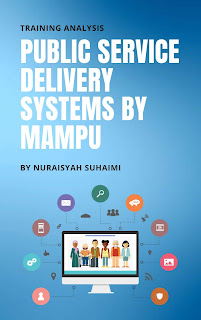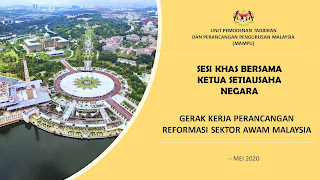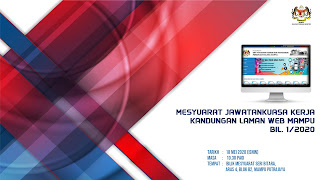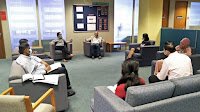Training Analysis: Public Service Delivery
Systems by MAMPU Nuraisyah Binti Suhaimi
Universiti
Sultan Zainal Abidin (UniSZA)
Training
Analysis:
Public Service Delivery Systems by MAMPU
The public has become more demanding
in how the Government should serve its services. They certainly do not have the
patience to go from one agency to another to be served. With citizens
experiencing better services delivered digitally from the private sector, their
expectations are that the Government is keeping up or to be ahead of current
trends.
Just like any other nation, Malaysia
has also recognized the Fourth Industrial Revolution (IR 4.0). As a response to
IR 4.0, the Government via Wawasan 2020 and
the 11th Malaysia Plan have started their digital plans, marking a step towards
digitalizing most of its services which transforms the way the Government
delivers its services to citizens. The
idea moving forward is about making government services available digitally
instead of physically.
The shift to Digital Government is a
big task. It requires a lot of effort to allow the Government to start
delivering such digital services and MAMPU stands at the background of these
efforts. As the agency tasked to oversee the public-sector ICT execution, MAMPU
takes responsibility to oversee the rollout of the Digital Government just as
its earlier iteration, e-Government.
Its work on e-Government saw Malaysia
being ranked by Accenture in the e- Government Readiness Index as among the top
25 countries in the world. Malaysia has also been ranked 63 out of 176
countries for ICT Development Index 2017 by International Telecommunication
Union (ITU). Oxford Insights has featured Malaysia at ranking 22 from
194 countries for Government Artificial Intelligence
Readiness Index 2019 and ranking 27 for Online Service Index (OSI) 2018. Under
the World Digital Competitiveness Ranking 2017 by IMD, the country was placed
24 out of 63 countries evaluated. The report also ranked Malaysia as the top
four countries in both Investment in Telecommunications and High-tech Exports.
The strong performance supported by a Government that is fully committed with
its digital agenda has placed Malaysia at ranking 4 out of 80 countries in Best
Countries to Invest In 2018 by U.S. News and World Report.
Executing modernization
Starting from the implementation of
e-Government onwards, many initiatives were taken to modernize the public
service delivery. MAMPU as the lead agency for ICT development in the public
sector has launched the Malaysian Public Sector ICT Strategic Plan 2016-2020
and the Government Service Delivery Digitalization Plan to guide all government
agencies in adopting digital technologies. But how does MAMPU ensure its
alignment? Because all government ICT spends have to come through MAMPU for
approvals. By having all proposals to come through MAMPU allows it to ensure
the projects meet the objectives, make sense and deliver the benefits.
Besides, to centralize the management and operation of
Malaysia’s public sector ICT, MAMPU has undertaken three tactical approaches
which are:
1) MAMPU is a central agency to chart and lead the strategic planning
of ICT operations and management for the public sector;
2) Be appointed as Head of ICT Services for the public sector who
authorized to manage human resource matters relating to ICT personnel; and
3) Strengthen the role of CIO at ministerial and departmental level who
will report directly to the Government CIO in
MAMPU.
Furthermore, MAMPU also established
an Enterprise Architecture for the public sector as a blueprint to guide
government agencies in their architecture development. What is meant by
Enterprise Architecture? It is an architecture and blueprint borrowed from the
world of architecture. Just as a city planner sets buildings and plans
facilities such as roads and water, introducing an Enterprise Architecture
means setting up the guidelines to be adhered to when developing software and
hardware solutions and services.
Moreover, many government online
services were developed by MAMPU to fulfill citizens and business needs. As of
June 2017, the percentage of government online services has reached about 88.5%
with 11,401 services available online.
To consolidate the ICT projects,
MAMPU has developed the Government Online Services Gateway, or GOSG through
MyGovernment portal that allows the Government to serve the community at only
one click. It integrates the services of all government agencies through a
single gateway to facilitate access. It is a dream for the public to have easy
access to apply for government aids, registering children for school, sitting
for examinations, paying taxes, registering business licenses, and many other
important events in everyday life—all done online, through one single website
MyGovernment.
MAMPU has also undertaken other ICT
consolidation initiatives via the implementation of the Public Sector Data
Centre (PDSA), government single telecommunication network (1Gov*Net), Public
Sector Big Data Analytics (DRSA), 1Gov
Unified Communication (1GovUC), Malaysian Government
Central Data Exchange (MyGDX), and Digital Document Management System (DDMS).
The initiatives have successfully led to an estimated cost savings of up to
RM800 million per year. In addition to cost optimization, other initiatives
such as the Public Sector Open Data (DTSA) enables data to be used and shared
freely by the public agencies and the people for various purposes.
Strategic communication plan
Above is a poll posted by me on
Twitter to analyze the awareness of MyGovernment website. 685 Twitterians
responded to the poll within 24 hours of testing. Even though it is asked among
internet users, 80% of them do not know about the website.
MAMPU is capable of developing
high-performance service delivery systems for the Government. However, those
initiatives did not receive adequate attention and awareness due to its poor
publicity strategies. Also, MAMPU is a “hidden gem” and lacks of mindshare. It
carried out great works, but never seem to get beyond their own inner circle,
the Government. The government officers and communities who do not recognize
MAMPU’s functions make them unaware of its products and initiatives in
modernizing the public service delivery. Thus, the use of initiatives are less
effective and inefficient.
Publicity is important because MAMPU
needs to be known by the public as an entity behind the modernization and
reformation of Malaysian Government. When the public knows Malaysia has a
specific team for modernization, it builds confidence within the public that
the
Government is strategic, competitive, and effective in
going digital. Also, successful publicity makes government officers and the
public aware of the products and initiatives taken by MAMPU in public sector
reformation and modernization. In the latest Bengkel Kajian Foresight Reformasi
Sektor Awam, the coordinator said that the initiatives need ‘to be done, to be seen done, and to be
communicated done’. These are the three keys to success because in the end,
the impact will be judged by the public or users, who will determine whether
the Government has moved with today’s digital era to meet their expectations of
public service machinery. If the initiatives failed to reach the public, it is
tough on the Government to reform the public service delivery, regardless of
how good the system is.
The Government can take advantage of
new forms of communication, social media, to increase its publicity. Social
media in government is a game-changer. On social media, people can engage in
direct dialogue with politicians, civic officials, and even entire government
agencies. They also have a chance to engage back. Social media benefits the
Government from building awareness to communicating the crisis. MAMPU is seen
to be an adaptive unit with its Facebook, Instagram, Twitter, and YouTube
accounts. However, its usage is out of keeping with the ethos of the platform.
The contents are either too formal, self-promoting, or ‘dry’. Even if formality
is the government’s standards and codes, the agency needs to adapt to the world
of social media and how it works on people. It is not enough to sporadically
update the contents. MAMPU needs to craft effective social media contents to
stand out on social media. Engaging with the public in social media is
important too. It increases responsiveness towards the public, has more control
over Malaysian narrative, improves service delivery and public satisfaction,
and also brings the public closer to the Government. Below is an example of the
idea.
This is an example of how AADK
engaged in a viral tweet on Twitter. It received more than 1k shares and likes by just
commenting ‘PM detail’ to a video of doing drugs. The agency did its publicity
by just responding to a viral post while doing its responsibility to fight
drugs.
Additionally, MAMPU can develop
relationships with third-party experts to communicate its initiatives, bring
awareness, and build trust within the public. Depending on the initiatives,
these influencers could be IT experts, economists, law students, bloggers, or
myriad other category specialists. Each brings a level of expertise and
knowledge within their discipline that
can be leveraged via partnerships. Why third party and not the spokesperson of
government? Because it is common for government officers to speak about the
Government. However, when a third-party influencer speaks positively about the
government news and products, it validates them within the public. Informations
are more credible as they are perceived to be third party endorsements verses
self-promotion. Third- party experts also have large social media followings.
Therefore, developing a relationship with these individuals can potentially
gain access to their connections.
MAMPU took years of painstaking
efforts to reform the public service delivery to keep up with its Digital
Government agenda. As a high-potential team, MAMPU has developed many
initiatives to make government services available digitally. What is left now
is to communicate those initiatives to the public. Communication is the bridge
between the Government and the public so, do communicate to spread awareness.









